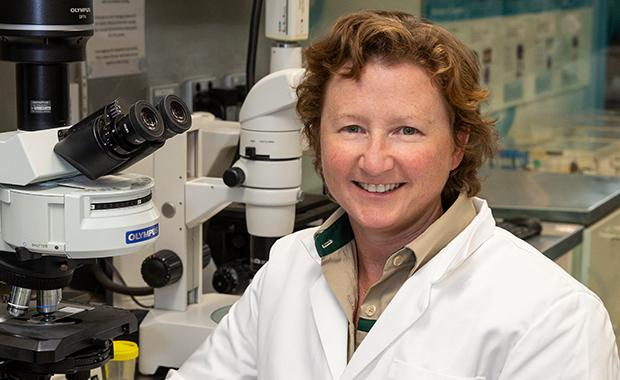- Wild and free: red deer grazing for conservation - 05/06/2019
- Sisters in Science: Dr Liz Dobson - 03/04/2019
- Closing the Gap Between Diversity Talk and Diversity Actions - 13/11/2018
Header image courtesy Zoos Victoria
In answer to the call for posts about ‘Modern Women in Science’, I decided to write about my sister: Dr Elizabeth Dobson BSc (Biology), BSc (Vet. Bio), BVMS (Hons), MSc, Diplomate ACVP.
Why my sister? Well, first because she’s an accomplished scientist in the field of veterinary and wildlife pathology. And second, because she’s had a unique career. It’s an example of how scientists can draw on diverse experiences to shape their future and play an active role in carving out a professional niche that aligns with their goals (and financial needs!).
Are we some kind of scientist family? Not at all. Liz and I come from a big family, being two of six siblings, and we are the only two that have taken the scientific route. Our other sister is a lawyer and our three brothers have worked variously in the building and landscaping industries, as a chef, writing poetry and in the public service. Liz and I had different motivations to become scientists and, despite having extremely different career paths, we have both “ended up” working on projects related to conservation biology.
So let’s look at Liz’s career path because it’s super interesting for scientists who might be wondering about diverse career options inside and outside of academia.
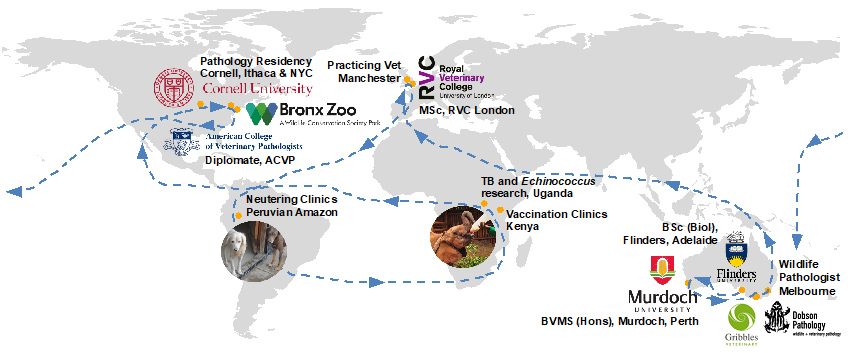
A Unique Career Path
Liz completed a Bachelor of Science at Flinders University in her hometown of Adelaide. During this time, she spent her holidays breaking in bulls on cattle studs, preparing yearlings for sale on thoroughbred studs and other miscellaneous farm duties.
She then moved to Perth to complete her veterinary degree with merit honours at Murdoch University. It was here that she got her dog Jed, an Australian Kelpie, when he was a small puppy. Liz worked for two years in mixed animal practice in rural NSW before heading to the United Kingdom for a mix of locum and permanent vet practice jobs over the next six years. Jed went with her.
While based in the UK, Liz undertook several international projects including assisting with TB research in Uganda at the domestic-wildlife interface, neutering clinics in the Peruvian Amazon, and vaccination clinics in the informal settlements of Nairobi.
She completed her Masters in Control of Infectious Disease in Animals at the Royal Veterinary College with distinction and won the project prize for her work on Echinococcus granulosus in domestic dogs and lions in Uganda.
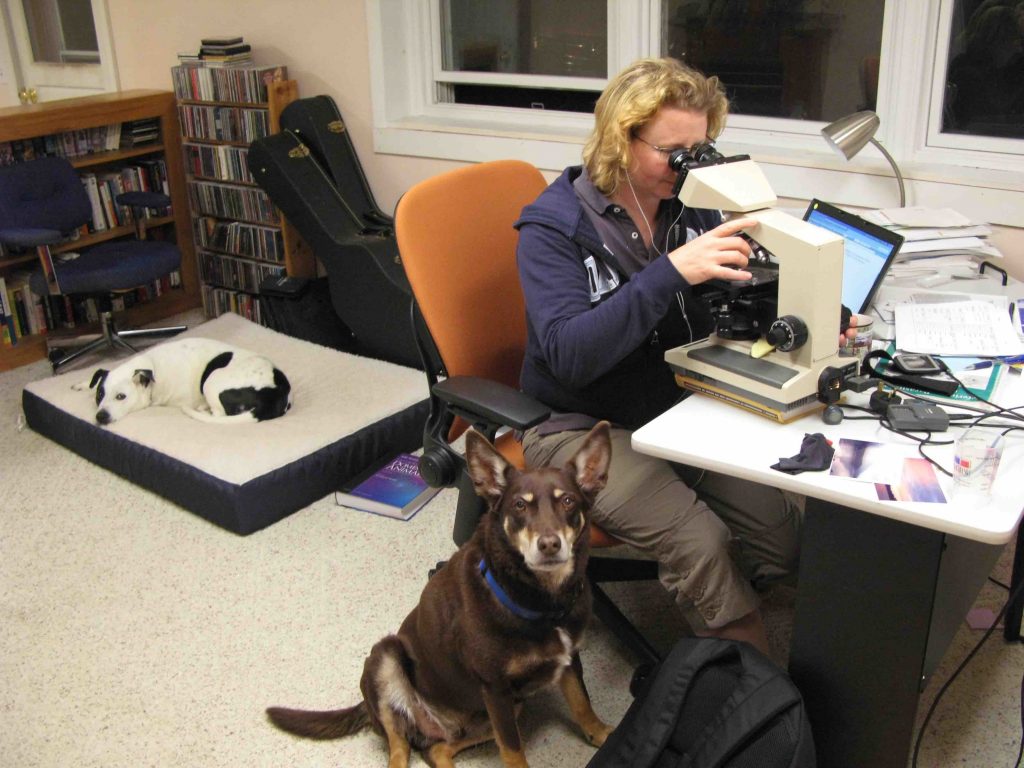
Dr Liz Dobson at work in Ithaca, USA during her pathology residency. Her cross-continental dog Jed (front) was born in Perth and lived his life in Australia, UK, USA and Kenya.
With Jed in tow, Liz then moved to Ithaca, USA to do a joint wildlife/anatomic pathology residency at Cornell University. Part of the residency involved a year working at the Bronx Zoo, New York City with the Wildlife Conservation Society. In 2010 Liz completed her American College of Veterinary Pathologists board exams.
Following this, she spent another year in Kenya working on infectious diseases. This is where Jed, now an old dog, spent his final days. Her favourite place to visit in Nairobi was the David Sheldrick Wildlife Trust where the orphaned baby elephants were being raised within Nairobi National Park.
Liz moved back to Australia in 2011 to start a job with Gribbles Veterinary Pathology. Here she worked on diverse aspects of wildlife pathology, in particular small animal neoplasia and hepatic and gastrointestinal pathology.
Branching Out
In 2017, after working at Gribbles for 5 years, Liz decided to branch out and start her own pathology business, Dobson Pathology, specialising in Wildlife and Veterinary Pathology. Running your own business involves what I sometimes think of as a “security/freedom” trade-off. At the expense of any kind of financial or work-load security, comes the freedom of deciding where you want the business to go and what kind of work you want to focus on.
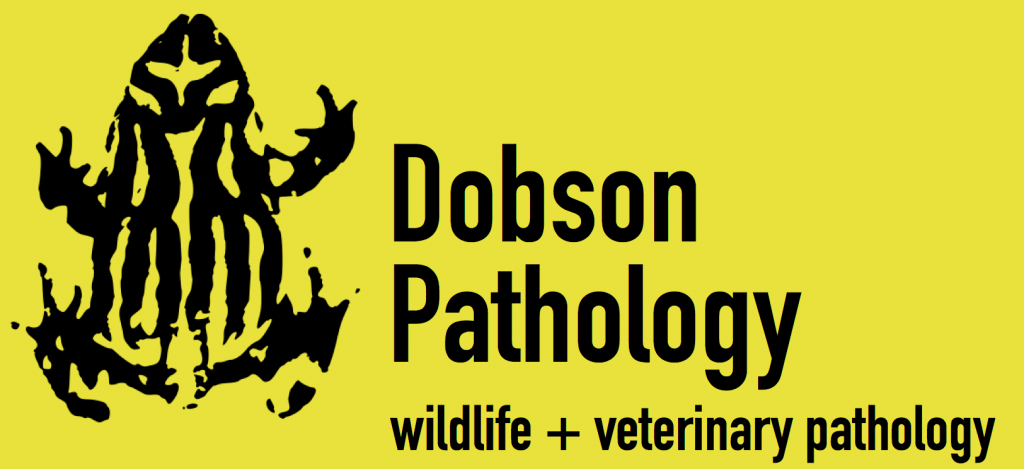

Liz’s business Dobson Pathology is currently working on a major conservation project for Zoos Victoria
Liz always had a passion for wildlife and this is where she decided to focus the attention of her business. After working on a number of small contracts, Liz secured her first major project with Zoos Victoria (she was recently profiled on their website for International Women’s Day). In this project, Liz is working with Healesville Sanctuary to help determine the cause of egg failure in two endangered bird species: Orange-bellied parrots and Helmeted honeyeaters.
A high hatching rate is a critical for increasing bird numbers in captive populations, but captive Helmeted honeyeaters and Orange-bellied parrots at Healesville have persistently low hatching and fledging rates. Helmeted honeyeaters are territorial and aggressive birds making management within the captive environment particularly challenging. Embryonic mortality between egg laying and the point where embryonic development can be identified with the naked eye can only be determined by evaluating the perivitelline membranes microscopically for evidence of nuclear development and the presence of sperm.
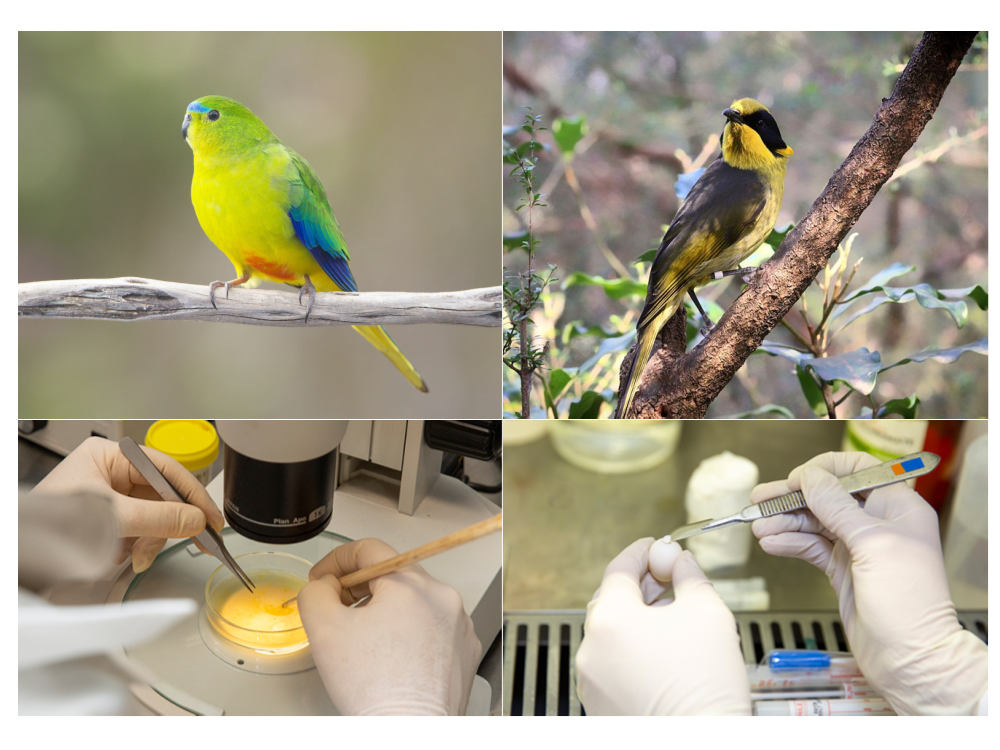
Liz’s work has helped to uncover the cause of egg failure in two endangered species: Orange-Bellied Parrots (top-left, photo JJ Harrison, CC-BY-SA) and Helmeted Honeyeaters (top-right, photo Dylan Sanusi-Goh CC-BY). Photos along the bottom show Liz working on eggs from captive birds.
Liz has designed an egg necropsy protocol for unhatched Orange-bellied parrot and Helmeted honeyeater eggs. Her protocol includes gross necropsy of the egg and fluorescent microscopic evaluation of the perivitelline membranes for sperm and nuclei to determine fertility.
Overall, Liz’s new role is allowing her to contribute to wildlife conservation by applying her wealth of knowledge and experience of pathology. In her own words:
“If we can reduce the hatchling failure, we can produce more Helmeted Honeyeaters which ultimately will be released to help boost the wild population”
______________
About the Author
Dr. Annabel Smith is a Marie Skłodowska-Curie Research Fellow in Zoology, Trinity College Dublin. Her current research focuses on the interaction between changing fire regimes and plant invasion. Find out more about her research here:
Website | www.smithecology.org
Twitter | @smithecology
Google Scholar | Profile
ResearcherID | M-6391-2014
ORCID | 0000-0002-1201-8713

